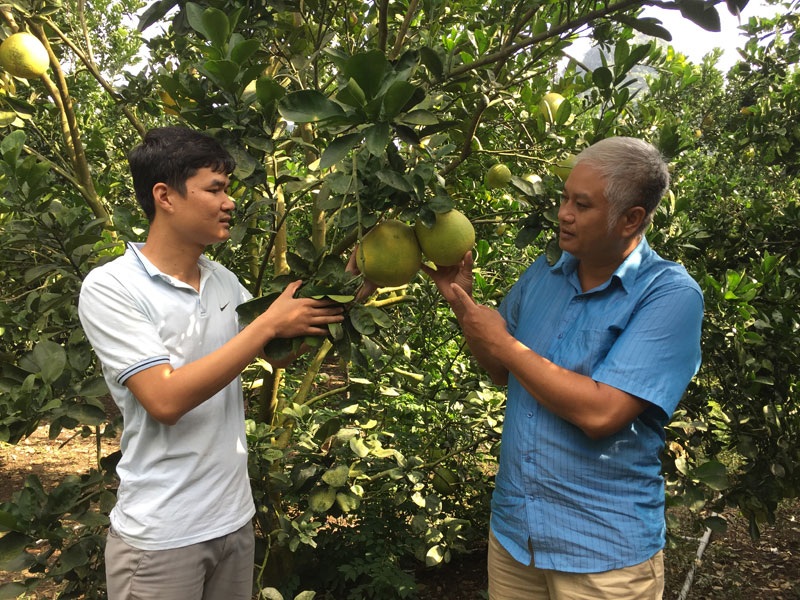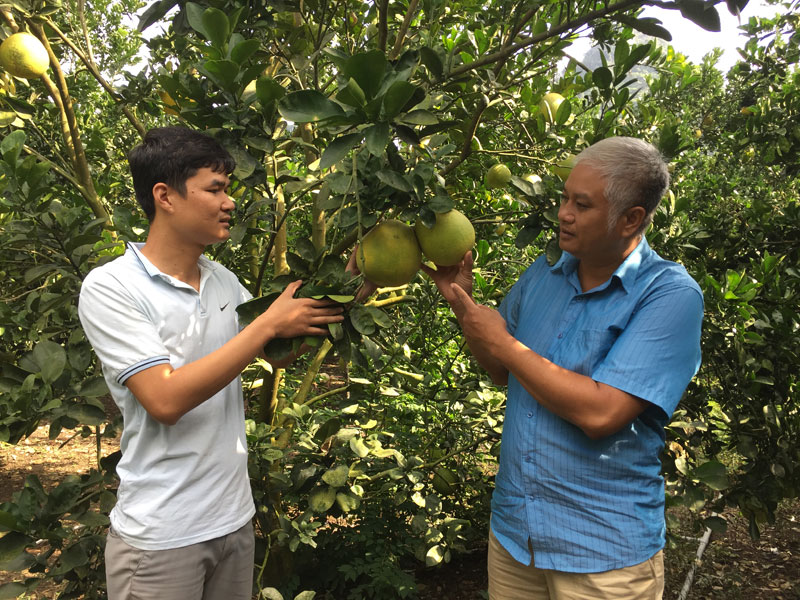
(HBO) - In the period from 2016 up to now, Huu Loi commune (Yen Thuy district) has expanded over 80 hectares of citrus fruit trees and have harvested about 5.6 hectares. Thereby they can improve their income step by step, improving the living quality of the local people, contributing to promoting local socio-economic development.

As a pioneer in planting citrus trees, Mr.
Hoang Anh Viet (right) 's family in Yen Loi village, Huu Loi commune (Yen Thuy)
earned about 700 million VND each year.
. The area of citrus trees in the commune is
mainly Dien grapefruit (70 hectares), oranges (7.6 hectares) being concentrated
in the villages of Vo, Roc and Dap. We visited the garden of Mr. Hoang Anh
Viet, Yen Loi village, the pioneer farmer of planting grapefruit from 2005 in the commune. Through
the knowledge, before planting citrus, he has grown apples, longans, leeches,
etc. but there was no good results. Recognizing that some households in Ngoc
Luong commune planted grapefruit effectively, Mr. Viet boldly planted 120 roots
on an area of about 5,000 m2. Thanks to the positive learning, research and
application of science and technology into the process of fertilization, the
pomelo garden of his family has developed well, earning the annual income of
200-300 million VND. From 2010 to now, Mr. Viet’s family has expanded the area
to 12 hectares with about 6,000 Dien pomelo trees.
At present, Huu Loi Commune in collaboration
with Social Policy Bank, the District Bank of Agriculture and Rural Development
created conditions for households to borrow capital for economic development
with a total debt of 26.1 billion VND. In which, many of these households used
this capital to invest in the development and expansion of citrus gardens. In
addition, the Commune Community Learning Center regularly cooperates with the
District Station of Agricultural and Forestry Encouragement to organize
training sessions and transfer the applied science and technology into citrus
care.
Mr. Quach Van Ngot, the Chairman of People's
Committee of Huu Loi Commune, said: "Thanks to the efficient development
of the citrus sector, the per capita income of the whole commune has reached 18
million VND / year, increasing by 4 million VND as compared to 2015. In the
coming time, the commune authorities will encourage households to continue to
improve their mixed orchards and to expand citrus fruit production areas, thus
creating links with traders in Hanoi, Ninh Binh, Nam Dinh, Thanh Hoa, etc. to
consume products.
According to data from the Hoa Binh Provincial Party Committee, the industrial production index for the first six months of 2025 is estimated to have increased by 20% compared to the same period last year. This marks the highest year-on-year growth rate for this period since 2020.
In the first six months of 2025, Hoa Binh province’s export turnover was estimated at 1.145 billion USD, marking an 18.11% increase compared to the same period in 2024. Import turnover was estimated at $ 804 million, a 17.15% increase, which helped the province maintain a positive trade balance.
The lives of the ethnic minority farmers in Tan Lac district have gradually improved thanks to the new directions in agricultural production. This is a testament to the collective strength fostered through the professional associations and groups implemented by various levels of the district’s Farmers’ Union.
With the motto the "product quality comes first,” after nearly one year of establishment and operation, Muong village’s Clean Food Agricultural and Commercial Cooperative, located in Cau Hamlet, Hung Son Commune (Kim Boi district), has launched reputable, high-quality agricultural products to the market that are well-received by consumers. The products such as Muong village’s pork sausage, salt-cured chicken, and salt-cured pork hocks have gradually carved out a place in the market and they are on the path to obtaining the OCOP certification.
In the past, the phrase "bumper harvest, rock-bottom prices" was a familiar refrain for Vietnamese farmers engaged in fragmented, small-scale agriculture. But today, a new spirit is emerging across rural areas of Hoa Binh province - one of collaboration, organisation, and collective economic models that provide a stable foundation for production.
Maintaining growing area codes and packing facility codes in accordance with regulations is a mandatory requirement for agricultural products to be eligible for export. Recently, the Department of Agriculture and Environment of Hoa Binh province has intensified technical supervision of designated farming areas and packing facilities to safeguard the "green passport" that enables its products to access international markets.



